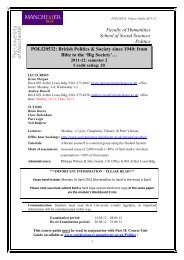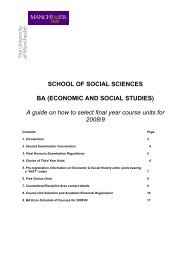CHNN 22, Spring 2008 - School of Social Sciences
CHNN 22, Spring 2008 - School of Social Sciences
CHNN 22, Spring 2008 - School of Social Sciences
Create successful ePaper yourself
Turn your PDF publications into a flip-book with our unique Google optimized e-Paper software.
Sidney occupied several leading positions in the ISL and the CPSA, working selflessly for both<br />
organisations. In order to give all his time to the party, he gave up his income, leaving his legal<br />
practice and resigning as director <strong>of</strong> a family business. One cannot say that he created a growing<br />
African following for the party single-handed, but he was the first to start this process and he<br />
contributed all his passion and talent to it. However, his reputation as a ‘native lover’ or ‘pronative’<br />
made his life increasingly difficult even among his comrades, let alone his relatives in<br />
London and South Africa. He fell out <strong>of</strong> favour with the Comintern because the wisdom <strong>of</strong> a ‘native<br />
republic’, as opposed to a ‘proletarian republic’, escaped him. But he bowed to the Comintern’s<br />
authority and preached the ‘native republic’. Perhaps his greatest achievement was his 1929<br />
election campaign in Thembuland – part <strong>of</strong> what later became Transkei, and is now part <strong>of</strong> the<br />
Eastern Cape province. He lost the election but the campaign made a huge impact: thereafter the<br />
CPSA was known as ‘Bunting’s party’ in this area and among broader circles <strong>of</strong> the African<br />
population. In the wake <strong>of</strong> this campaign Sidney organised the League <strong>of</strong> African Rights in order to<br />
fight against a set <strong>of</strong> new discriminatory laws just enacted.<br />
This was against the wishes <strong>of</strong> the Comintern: Moscow wanted the African masses to fight not by<br />
petitions but by radical action. This started an anti-Bunting frenzy among the party leadership;<br />
and, although a large group <strong>of</strong> African supporters tried to fight for him, in 1931 he was expelled<br />
from the party and then even from all the party front organisations, such as the Friends <strong>of</strong> the<br />
Soviet Union. The accusations against him were nonsensical and the campaign against him truly<br />
ugly. This shattered him: the party was his life, and he firmly believed that he – or any other<br />
communist – neither should, nor could act without it. He was also left without any means <strong>of</strong><br />
existence. His last years were terrible. It was too late to start from scratch: in 1931 he was fiftyeight.<br />
He ended up playing the viola in an orchestra to support his family, but even this was too<br />
hard as the job involved a lot <strong>of</strong> travelling. Redemption came only after his death five years later:<br />
his supporters organised a massive ‘red’ funeral for him, at which the left <strong>of</strong> all persuasions<br />
gathered to pay their last respects. But the party never rehabilitated Sidney Bunting: neither then,<br />
nor later.<br />
Allison Drew has written an unbelievably detailed chronicle <strong>of</strong> Sidney’s life. We learn where the<br />
family <strong>of</strong> Bunting Sr. spent its every holiday, what marks Sidney got at school, what disputes he<br />
participated in and with what result. We discover the background <strong>of</strong> his school teachers and<br />
university lecturers, and how the rooms he occupied in Magdalen looked. We learn every turn <strong>of</strong><br />
Sidney’s prolonged involvement in the family business in Natal, and virtually every detail <strong>of</strong> that<br />
business too. Then there are his writings, his speeches and his letters to his wife and sons, as well<br />
as detailed accounts <strong>of</strong> party meetings. We even learn <strong>of</strong> the behaviour <strong>of</strong> his relatives, colleagues<br />
and friends towards him at every stage <strong>of</strong> his life and his political career. Drew’s list <strong>of</strong> notes takes<br />
forty pages and contains every possible relevant archival collection and book. And, despite her<br />
dispassionate style, the books sucks in the reader like a novel. It is an engaging life <strong>of</strong> an<br />
outstanding personality.<br />
Yet, gaps remain. It is still not clear, why Sidney became a communist. There is no hint in the book<br />
that he even read any marxist literature before he joined the party. However, he was not an<br />
ordinary member: he became a knowledgeable communist, who took the idea <strong>of</strong> the party<br />
discipline to heart. He also accepted the party idea that however one debates issues within the<br />
party, organising a faction is the road to disaster. Such a change could not come about overnight,<br />
but we do not see it. Bunting as a personality remains outside the scope <strong>of</strong> this book.<br />
The same is truer still about his wife, Rebecca Bunting. She was a powerful personality in her own<br />
right, a staunch communist and also a founder-member <strong>of</strong> the party. Drew gives a lot <strong>of</strong> details<br />
about her – even <strong>of</strong> her illnesses – yet Rebecca’s persona remains even more mysterious than<br />
Sydney’s. She seems to be always in his shadow.<br />
In other words, Drew does not <strong>of</strong>fer explanations, visions or guesses to the reader: she <strong>of</strong>fers facts<br />
but not interpretations. She has produced an excellent biography – but the author is strangely<br />
absent.<br />
Irina Filatova, Pr<strong>of</strong>essor <strong>of</strong> Moscow <strong>School</strong> <strong>of</strong> Economics (Russia) and Pr<strong>of</strong>essor<br />
Emeritus <strong>of</strong> the University <strong>of</strong> KwaZuluNatal (South Africa)<br />
54
















